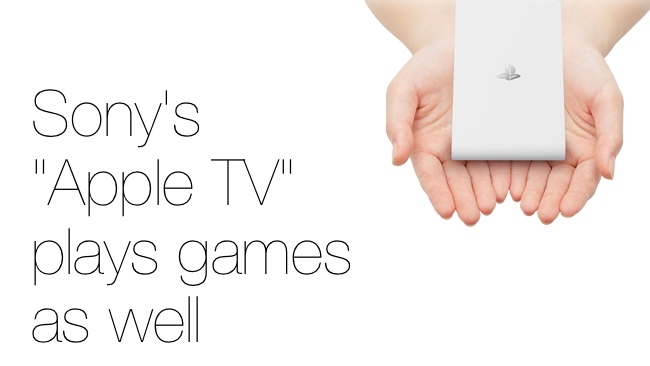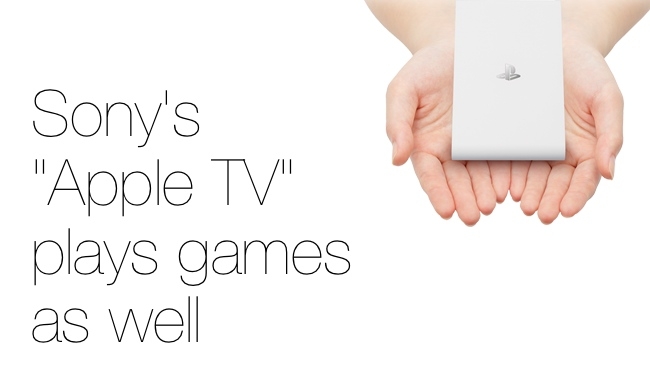
 Sony's Apple TV?
Sony's Apple TV?
While PlayStation 4 is the headline act for November launch here and in America, Sony's home territory will be first with a very different gaming/multi-media device. Priced 9,954 yen with tax (about $100 USD or £64), PS Vita TV will arrive on November 14 and at a raw technology level simply crushes Apple's hardware. K. Stewart reports for RedShark
The third-generation, £99 Apple TV has a chipset optimised for power efficiency and cost reduction. The dual-core A5 SOC introduced with the 2011 iPad 2 is stripped down to a single core ARM Cortex A9 CPU with a dual-core PowerVR SGX 543MP2 GPU. So just about the minimum needed to drive a slick interface for streaming content.
PS Vita TV, by contrast, is a full-fat implementation of the 2011 PS Vita handheld chipset; which is to say a 2Ghz quad-core ARM Cortex A9 CPU with Quad-core PowerVR SGX543MP4+. Within the constraints of a mobile system, PS Vita isn't too far off a pocketable PlayStation 3 and there's nothing performance inhibited about its TV variant at all.
PS Vita has yet to discover a true killer app, but its library of some 100 games includes decent versions of Assassin's Creed, Metal Gear Solid and Killzone. Games which make use of the handheld console's touch and camera features won't initially be compatible, including Uncharted and Gravity Rush, but then there's the device's backwards compatibility with a vast array of PSP and PlayStation One (PSOne) games - some 1,300 titles in total according to Sony.
The Appeal of the System
The system's appeal to gamers is further extended by its ability to remote play PS4 games, so a living room PS4 could be played on a bedroom TV equipped with PS Vita TV. In the future, it could even offer access to PS3 games via the same cloud technology designed to offer PS3 games to PS4 owners. And for a controller, no expensive iDevice required - just a standard DualShock 3 or 4 controller.
It will also have the same built-in web browser and email client as PS Vita. Admittedly neither are currently world-class but that's still an advantage over Apple TV which has neither. As a media device, Hulu and Niconico (Japan's YouTube) are already onboard and it's difficult to imagine Netflix et al wouldn't be available for an as yet unconfirmed Western launch.
Apple TV and its Unique Advantage
Apple TV is a more than decent media streamer, of course, but BBC iPlayer support still has to come from AirPlay-ing from an iDevice - well executed, of course, but not as a seamless as a native app. And gaming is really little more than a footnote by way of comparison. It's a neat Apple Store demo to show your iPhone game being live streamed onto on a 40-inch HDTV, but it rarely translates into a natural gaming experience.
Apple TV's unique advantage is, of course, copy-protected media - TV shows and movies bought on iTunes can't be streamed over DLNA. You need Apple TV for that.
So this is where PS Vita TV is perhaps most interesting and why it's so notable that the press release places TV services before games. As a gaming device, it's infinitely superior to Apple TV but still second-best to PS3 with GTA V, MGS5, The Last of Us etc., let alone PS4. As a streaming device, however, it's a fan-less device about the size of a pack of cards and a chipset that's only going to reduce in price.
Sony's Position
RedShark News recently reported on Sony's moves into OTT, or Over The Top content. At the high-end, Sony has its unique FMP-X1 4K Ultra HD media player, while PS4 will also be capable of handling 4K streamed video and PS3 is well proven for 1080P. PS Vita TV slots in nicely as an ultra-compact, low cost option and, soon, there'll be an even cheaper option with the BRAVIA Smart Stick (a plug-in Google TV initially for a limited set of Sony TVs).
Apple's key insight with Apple TV is that while a 4K OLED iTV might have great hardware margins, TV is a content business that respects above all scale, whether its rental subscribers or film purchasers, to negotiate content rights with Viacom you need immense scale.
The broadcast TV business isn't yet dead, but the contours of the Internet-led business to replace it are becoming much clearer with each uptick in high-speed internet access. And Sony is very serious indeed about being a major content player.
By K. Stewart
Important Links
Japanese homepage
English language PS Vita TV press release
BRAVIA Smart Stick Online Manual
Tags: Technology



Comments